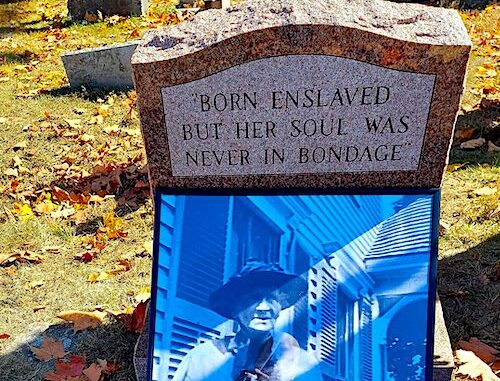
Former Luray slave who earned freedom and brought family to Worcester, Mass., now stands as key historical figure in both communities
By Randy Arrington
WORCESTER, Mass., Oct. 5 — After being recognized with the dedication of a memorial garden near the Luray Singing Tower more than a year ago, descendants of Bethany Veney raised funds to have her headstone replaced at her final resting place in Worcester, Mass. The headstone was unveiled during an Oct. 5 ceremony that included Luray residents Del Price and Rod Graves.
“Great gathering, beautiful fall day. Family from near and far. VIPs all that. She’d be proud. Her perseverance paid off,” Price, a descendent of Veney’s, stated in a recent social media post following the event. “Inspired by efforts in the Shenandoah Valley recognizing Bethany Veney’s struggles while in bondage and perseverance throughout her long life and ultimate settlement in Worcester following freedom, her family sought out her burial site.”
The Luray native was born into slavery in 1812. New England laborers working in Virginia hired her to help them and later rewarded her with freedom. Veney worked as a cook and sold her own dyes, eventually buying three homes in Worcester and moving many family members, including her children, from Virginia to the Massachusetts town after the Civil War. Her descendants ended up playing critical roles in Worcester’s history, serving as the first black police officer and the first black public school teacher.
“I loved the opportunity to participate and loved seeing the community she brought her family to now so diverse,” Price stated in her post. “I spoke with one Greg, at the Cemetery, who implored me to go to the Worcester Historical Museum. He looked Irish.…nope: Albanian. Other large groups of immigrants: Ghanaians, Vietnamese, Puerto Ricans, Dominicans, Brazilians. I stayed at a Boutique hotel owned by a Brazilian immigrant whose own grandmother was enslaved in Brazil.”
Veney is best known for her narration of her life, captured in the book “Aunt Betty’s Story” published in 1889. Historians consider the work a key part to understanding the experiences of enslaved people in the 19th century. From being born a slave, Veney became successful in business and helped her family in many ways. Not only is she considered a remarkable historical figure in Luray, but the Worcester Telegram & Gazette stated that: “Bethany Veney is one of the most remarkable people to ever call Worcester home.”
And Price agreed.
“She has kept us all connected, and the incredible thing about her was how big of a spirit she had. She wasn’t mean — in her biography she writes about how she had a nice pair of gloves, and her former enslaver, a man named McCoy, came up to visit her, and he admired them and asked her where she got them,” Price told the Telegram & Gazette. “She then bought him a pair of gloves. I don’t think I have that kind of heart. She was a unifier and she was a person who was benevolent.”
Known as a strong person of faith, Veney died in 1915 at the age of 103. Her headstone had gone missing in recent decades at Hope Cemetery, where Veney had purchased 16 burial plots for family members. In addition to donations by descendants, the Worcester Black History Project and Luray Caverns helped to replace the headstone.
The Oct. 5 unveiling in Worcester that drew dozens of descendants from as far away as California, drew inspiration from the June 10, 2023 remembrance garden dedication in Luray, according to Price, who serves as president of the Shenandoah Valley Black Heritage Project. The space for the local memorial, which includes an interpretive historical marker, was donated by Luray Caverns (along with materials and labor), and it is maintained by the Luray Garden Club. It was originally landscaped by the Hill and Valley Garden Club and Brick House Nursery. The Town of Luray and the Comer Family provided an antique bench.
The Bethany Veney interpretive marker and remembrance garden are part of the Shenandoah Valley Battlefields Foundation’s Long Road to Freedom Project. Supported by a grant from the National Park Service, the Long Road to Freedom Project will create a Valley-wide trail to tell the story of African-Americans in the Shenandoah Valley during the Civil War era and during the long journey from Civil War to Civil Rights. Working with partners, the trail will link together historic sites and stories throughout the Valley with wayside interpretive markers, state historical markers, orientation panels, promotional materials, a trail-wide visitor guide, a website, and digital and technological tools.
“Her strength of character and love, when I first read her book 35 years ago, it really captivated me and it still does,” Rod Graves told the Worcester Telegram & Gazette. “She wanted to make sure that her and her family were free, and she became a very prominent citizen of this community of Worcester. We can’t wait to expand upon her story even more at the [Luray] museum.
“She is a hero back home too.”
•••
RELATED ARTICLES
Laurel Ridge celebrates life and narrative of Bethany Veney at Jenkins Hall
Page County Public Forum hosts ‘Page County History of Free & Enslaved Blacks’




Question. If white people had never existed, how and where would she have been buried?